The Law and Society Association Honors its 2025 Award Winners!
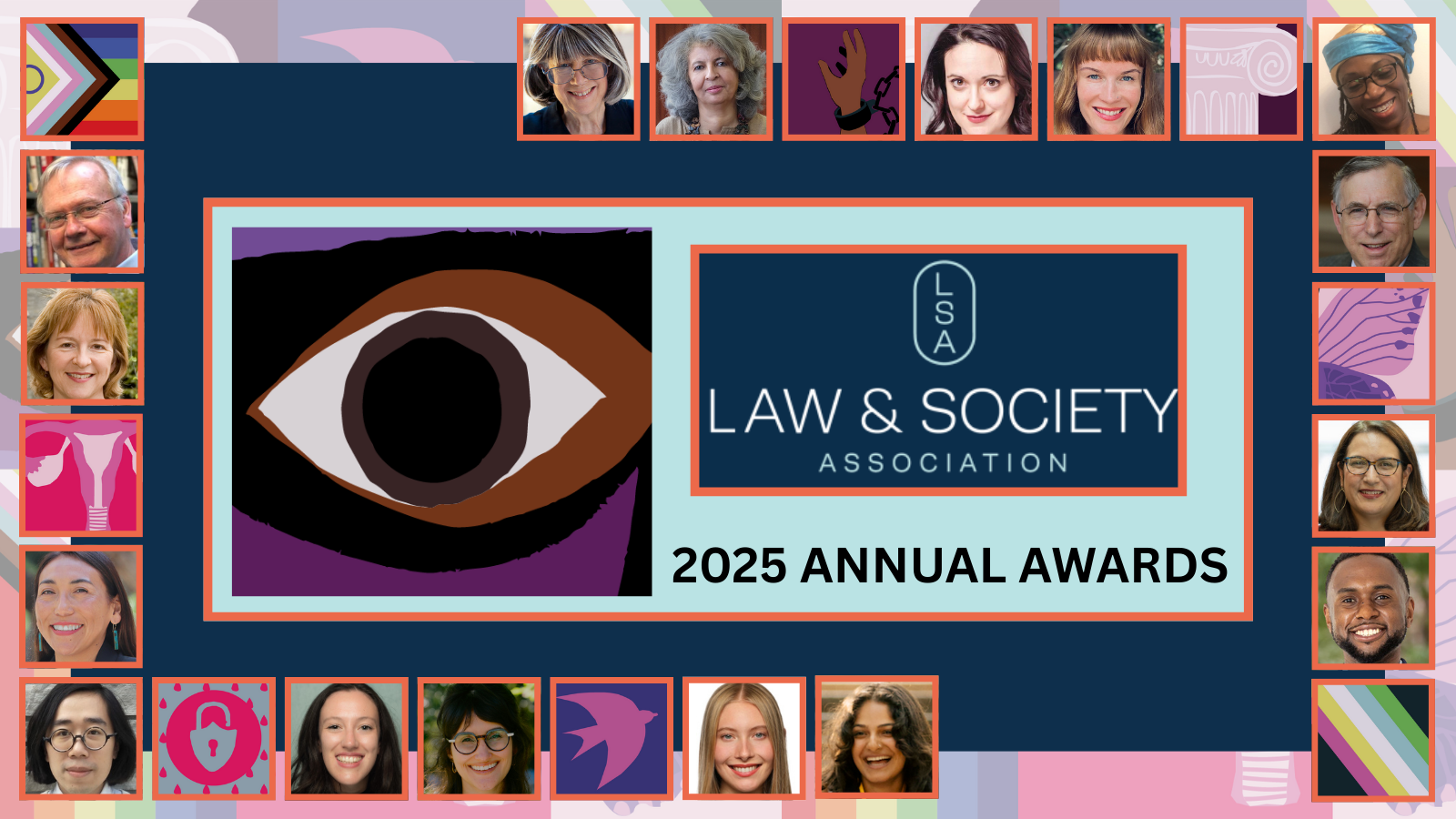
AMHERST, Mass. – The Law and Society Association extends a warm congratulations to the 20 winners of its 2025 Annual Awards.
LSA honors leading international scholars each summer for their groundbreaking publications and contributions to the study of law and society. To view more information about each of the winners, check out our Awards Page.
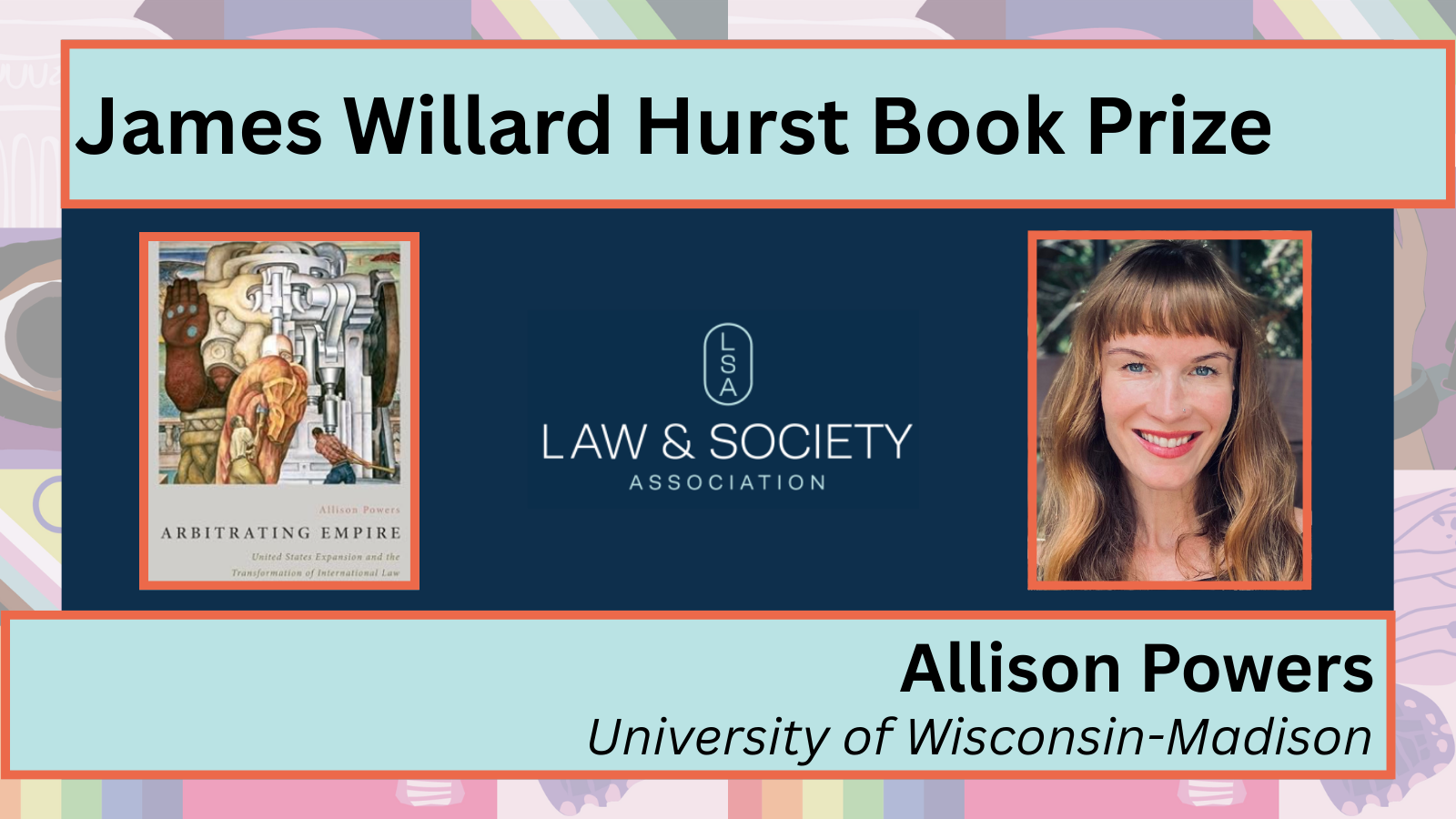
James Willard Hurst Book Prize
WINNER: Allison Powers, Arbitrating Empire: United States Expansion and the Transformation of International Law
Allison Power’s book Arbitrating Empire: United States Expansion and the Transformation of International Law is a tour de force, drawing extensively on archival research to provide a richly textured account of the United States’ role in transforming international law. The book’s impressive nuance and rigorous historical detail traces how the United States has wielded authority not only to shape outcomes in international disputes through formal law and the use of international tribunals, but also at local economic levels such as Cuban sugar plantations, the locks and stops of the Panama Canal, the Texas cotton fields, and Arizona copper mines.
The book is an excellent achievement that never loses sight of the consequences of the U.S. government’s political and economic influence in international law, disputes, and economic violence. It is a work that thoughtfully narrates how “ordinary people” from throughout the world have attempted to use international law to advance the search for justice. The manuscript is compellingly written, and thoroughly researched. It resituates how American law and power have been framed during the past two centuries and the communities rendered invisible. It is an excellent contribution to law and society scholarship.
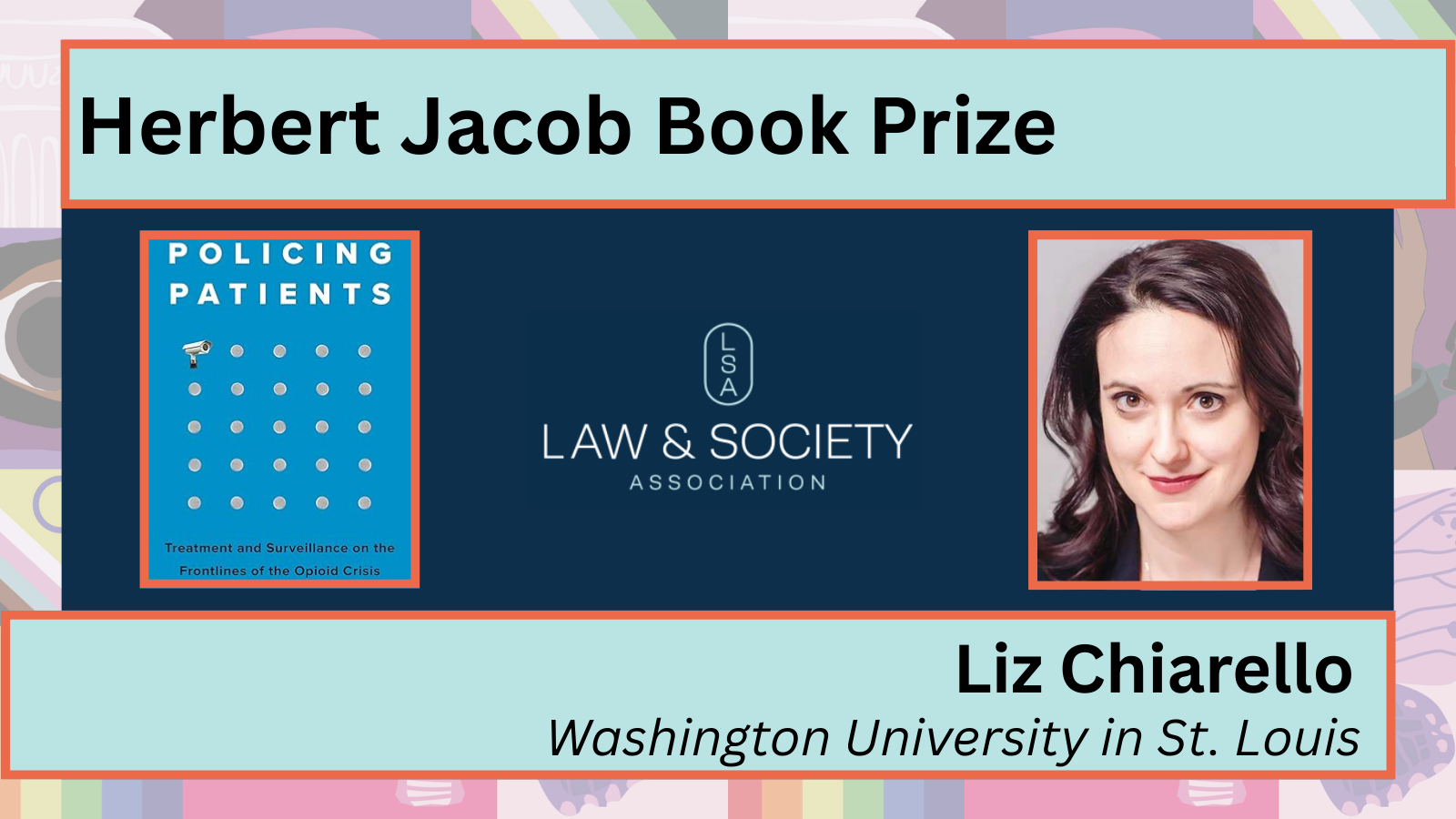
Herbert Jacob Book Prize
WINNER: Liz Chiarello, Policing Patients: Treatment and Surveillance on the Frontlines of the Opioid Crisis
Policing Patients: Treatment and Surveillance on the Frontlines of the Opioid Crisis examines how healthcare and policing intersect on the frontlines of the opioid crisis across the United States. Importantly, Professor Chiarello adds the perspectives of pharmacists to the ongoing conversation about the opioid crisis, and she focuses on prescription drug monitoring programs as a surveillance mechanism that connects healthcare and law enforcement professionals. She succinctly exposes deeply rooted and broader issues within the American (criminal) legal system that tries to solve social issues through law enforcement. Analyzing over 300 interviews spanning eight states and more than three professions, Chiarello points out the harms of allowing technology to blur the lines between law enforcement and healthcare and critiques the current policy focus on treatment as being too narrow and too late. Ultimately, her work suggests that the solution lies in a broad and comprehensive approach to policy and practice.
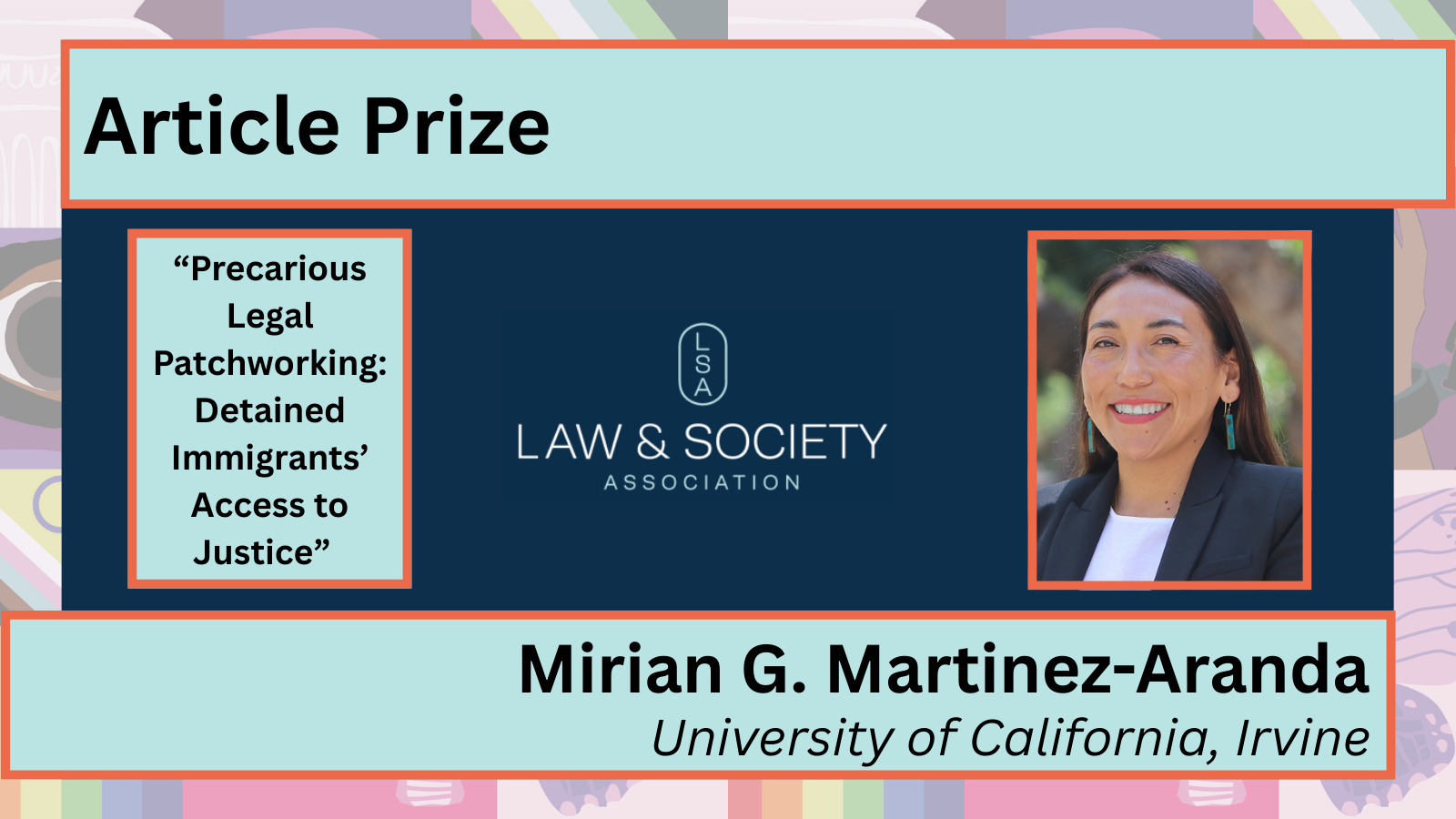
Law and Society Association Article Prize
WINNER: Mirian G. Martinez-Aranda, “Precarious Legal Patchworking: Detained Immigrants’ Access to Justice”
Published in Social Problems, this paper draws on extensive interview research with over 50 formerly detained undocumented immigrants to tell rich and detailed stories about the obstacles they faced in accessing justice while in detention, and the innovation they showed by cobbling together what legal resources they could. Martinez-Aranda calls this strategy “precarious legal patchworking (PLP),” extending existing research on immigrant survival strategies into carceral contexts. While this patchworking is an important expression of agency and makes a difference in some cases, its results are uneven and unreliable. This methodologically rigorous paper speaks directly to one of our era’s most defining questions of in/justice, painting a finely textured picture of the ways Martinez-Aranda’s research participants experienced detention and fought against it. Its theoretical contribution of PLP is fully realized and expansive, immediately usable by researchers working in other subfields and empirical contexts. This is exactly the kind of outcome the Article Prize hopes to inspire.
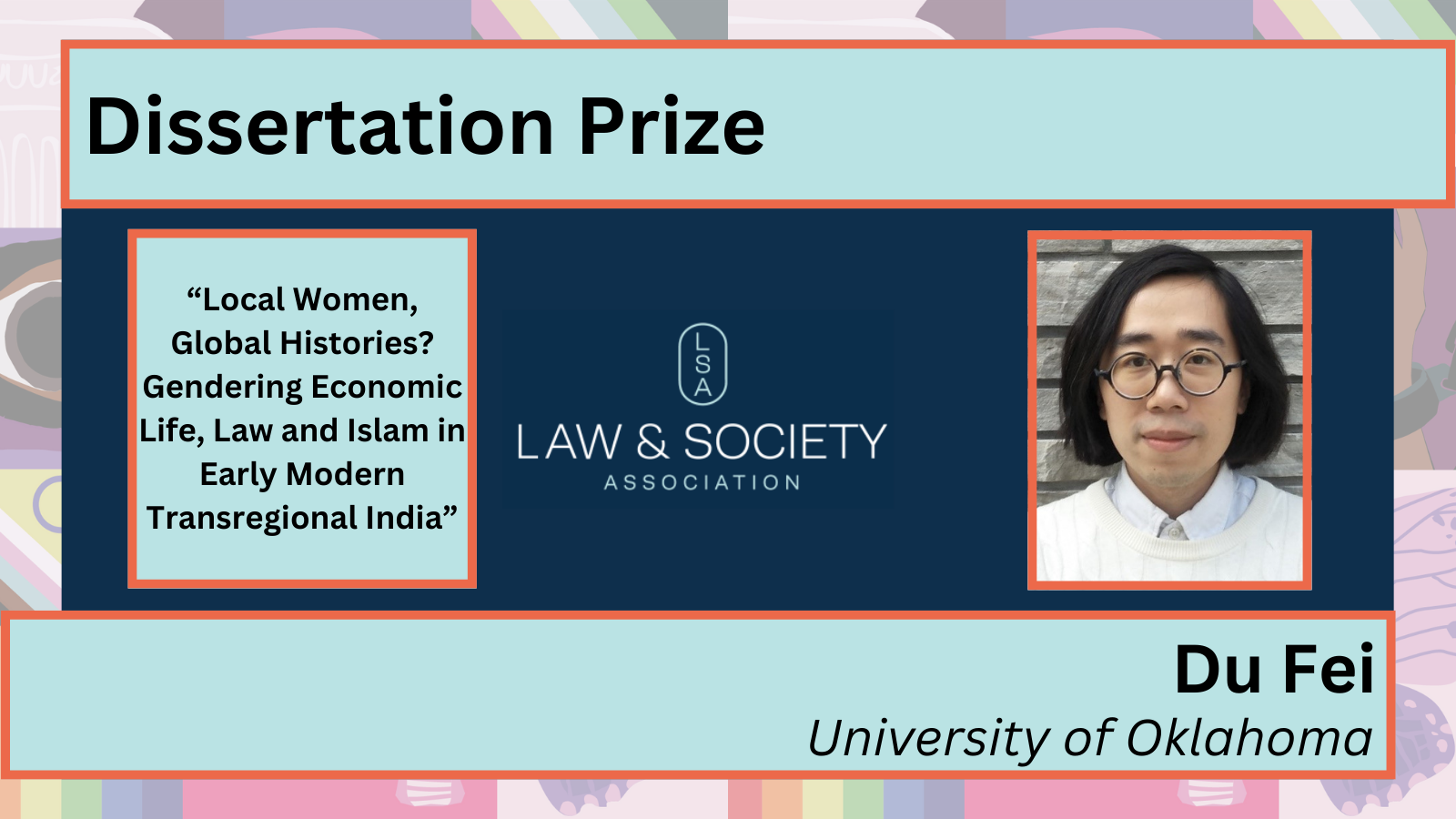
Law and Society Association Dissertation Prize
WINNER: Du Fei, “Local Women, Global Histories? Gendering Economic Life, Law and Islam in Early Modern Transregional India”
Du Fei’s dissertation, “Local Women, Global Histories? Gendering Economic Life, Law, and Islam in Early Modern Transregional India,” challenges gendered constructions of Islamic law and reveals how gender-insensitive narratives have shaped dominant histories of trade and travel in global Islam. While Muslim women in transregional India are often portrayed as passive or economically marginalized, Fei shows that some acted as strategic negotiators—engaging with jurists, judges, and male kin to assert claims through Islamic law on property and inheritance. Rather than being confined to the private sphere, these women regularly negotiated with male kin, jurists, judges, and officials in multiple courts. Taking readers across the lands and seas of South Asia, the Middle East, and Southeast Asia, Fei effectively constructs a new archive for the legal history of South Asia, drawing on sources in Persian, Arabic, English, and Dutch.
By positioning the household as a critical site of economic activity, the dissertation also unsettles simplistic accounts of patriarchy and offers a major methodological and substantive contribution to the economic and legal history of global early modernity. It advances scholarship on legal pluralism by demonstrating how women navigated overlapping legal traditions as they engaged in debates among Muslim jurists, colonial officials, and Orientalists. In short, Fei’s dissertation represents the epitome of law and society scholarship.

John Hope Franklin Prize
CO-WINNER: Jasmine E. Harris, “The Political Economy of Conservatorship”
Jasmine E. Harris’s “The Political Economy of Conservatorship,” published in the UCLA Law Review, reinterprets conservatorship as a tool of racial and economic subordination. Harris weaves legal history, disability theory, and racial critique into an incisive analysis of how disability law has been used to extract labor and property from Black and Indigenous communities. By connecting conservatorship’s historical deployment to its contemporary operation, Harris exposes the system’s deep-seated structural harm. Her article exemplifies socio-legal scholarship at its finest and proposes an abolitionist framework with broad implications for race, disability, and legal reform.
CO-WINNER: Daniel S. Harawa, “Coloring in the Fourth Amendment”
Daniel Harawa’s “Coloring in the Fourth Amendment,” published in the Harvard Law Review, delivers a powerful and incisive challenge to the colorblind assumptions embedded in Fourth Amendment jurisprudence. By exposing how race-neutral legal standards mask racial subordination in policing, Harawa articulates a doctrinal and normative argument for a race-conscious reasonable person standard. Grounded in constitutional theory and racial justice advocacy, this article exemplifies rigorous scholarship and has the potential to reshape legal understandings of policing, seizures, and race.

Law and Society Graduate Student Paper Prize
CO-WINNER: Iolanthe Brooks, “Shuffling Within the System: The Pervasive Uncertainty of Prison Transfers”
Iolanthe Brooks’ terrific paper explores how carceral state institutions utilize movement as a form of punishment for incarcerated individuals. Brooks labels this novel concept “within-system shuffling,” wherein state carceral institutions transfer inmates to discipline and undermine those individuals that administrators feel cause trouble. Through a vibrant and breathtaking qualitative journey, Brooks’ work brings this concept to life. Ultimately, Brooks finds that within the system, shuffling is a tool that helps reinforce uncertainty and power for incarcerated individuals. This turns out to be the real gem of the paper, as it forces us to think about how movement itself can be viewed as an extension of governing power and compels us to consider how that power can be felt both individually and collectively.
CO-WINNER: Roberta S. Pamplona, “Reframing Feminist Ideas, Challenging State Incorporation: Activism Against Violence and the Feminicidio Law in Brazil”
Roberta Pamplona delivers an outstanding entry that examines what happens when the state co-opts feminist ideals into the criminal code. While it may be tempting to think that state co-optation would automatically lead to negative consequences, Pamplona’s work uses the Brazilian context to show that reality is much more complicated. In particular, Pamplona demonstrates how feminists’ continual advocacy and activism have helped to extend the “co-opted” concept “feminicídio” beyond the ideals supported by the state. In doing so, this work is a bright spot in a political landscape where people are constantly searching for answers and seeking hope on how to move forward. The brilliance of Pamplona’s work is that it illuminates two pathways forward: one in which organizers and activists allow the state to restrict and co-opt their concepts, and another in which activism can help expand and change state incorporation. The choice is, of course, ours.

Law and Society Association Undergraduate Student Paper Prize
CO-WINNER: Avani Singh, “Judicial Insights: Unraveling Mental Health Decisions in Collaborative vs. Traditional Courts”
Avani Singh’s dynamic paper is a comparative analysis that explores how judges in traditional courts and mental health courts understand their work. Conducting an array of impressive interviews, Singh finds that judges’ problem-solving models impact their perception of effectiveness in the court system. Particularly, Singh finds that the medical model is increasingly perceived as more effective in handling mental health issues, but effective judicial training on the use of the medical model still lags behind. Ultimately, Singh’s work forces us to grapple with why criminal courts and law are seen as the best venue to deal with mental illness and pushes us to think more deeply about the relationship between power, law, violence, and mental illness.
CO-WINNER: Celia Parry, “Strange Bedfellows: Guardians for Fetuses and Future Generations”
Celia Parry’s impressive paper explores the use of legal guardianship in anti-abortion cases to show how climate activists can learn from and adopt similar logics. Building on this, Parry identifies three key lessons climate litigators can adopt from the fetal guardianship context: 1) flexible civil procedure codes and constructive processes can lead to success, 2) below-the-radar advocacy is preferential, and 3) the reopening of debates around legal personhood in light of Dobbs. Keen to point out flaws, Parry notes that one potential drawback of their approach is that this strategy risks entrenching legal guardianship in the anti-abortion context, which would be an unfavorable outcome. Nevertheless, through sharp and insightful analysis, Parry persuasively makes the case that these avenues are meaningful starting points for future generations seeking to protect the climate.

Ronald Pipkin Service Award
CO-WINNER: Susan S. Silbey
Few names are more synonymous with law and society scholarship than Professor Silbey’s. Her research has long examined the relationship between law and lived experiences. Her much-lauded 1998 book, The Common Place of Law (co-authored with Patricia Ewick), helped define the field of legal consciousness, offering a deeply sociological account of how people talk about, experience, and reproduce “hegemonic legality.” Silbey and Ewick argue that legal consciousness is not simply a matter of internal belief—it is a patterned way of enacting law and interacting with systems of power, made up of shared cultural schemas that shape how law is understood and navigated in everyday life.
An anchor within the Law and Society Association for over 40 years, Silbey is known throughout the organization as a valued mentor—one who demands rigor, precision, and clarity, but does so with generosity and warmth. Many of today’s leading law and society scholars, including multiple former LSA presidents, trace their intellectual roots to her mentorship. Her colleagues and former students describe her as someone who takes ideas seriously, who reads widely and deeply across disciplines, and who relishes engaging with others’ work as much as she does refining her own. She is fiercely committed to dialogue and discovery, and her mentoring relationships are marked by deep thought, critical feedback, and lasting intellectual bonds.
In addition to serving on the Board of Trustees as President (1995-1996) and as Editor of the Law and Society Review (1998-2001), Professor Silbey has held a long list of service roles within LSA. There are too many to name, but among them include: Treasurer, Trustee (class of 2020), and Chair of the Program Committee, Publications Committee, Nominations Committee, multiple prize committees, the Local Arrangements Committee, and the LSR Editor Search Committee. Her leadership in these roles helped shape not only the trajectory of sociolegal research but also the core structures and values of the community that surrounds it.
CO-WINNER: Penny Andrews
A distinguished member of LSA for over 25 years, Professor Penelope Andrews has contributed immensely to the intellectual and institutional life of the Association. Her leadership has strengthened LSA’s global presence, supported new generations of scholars, and fostered a more inclusive and vibrant community. Her long-standing commitment to service has helped shape the organization’s growth and evolution.
As LSA President from 2019 to 2021, Professor Andrews guided the Association through the unprecedented challenges of the COVID-19 pandemic. Her steady and compassionate leadership during this time ensured that the Association remained connected, responsive, and forward-looking. She worked closely with members, staff, and students to sustain programming and deepen the Association’s international engagement, with a particular focus on expanding participation from the Global South. Beyond her presidency, Professor Andrews served as Co-Chair of the 2014 Program Committee for LSA’s pivotal 50th Anniversary Meeting, LSA Trustee from 2011 to 2014, Co-Chair of the International Activities Committee, Chair of the Ad Hoc African Renaissance Committee, and member of several other key committees, including the Diversity Committee, the Nominations Committee, and the Program Committee. In addition to co-founding and hosting the South African Reading Group in New York City for nearly three decades, creating a unique space for interdisciplinary dialogue among scholars, practitioners, and students, Professor Andrews has helped organize scholarly events across the U.S., Canada, and South Africa, always centering equity, access, and intellectual rigor.
Through all of her roles—in the academy, the profession, and especially within LSA—Professor Andrews has consistently demonstrated vision, generosity, and commitment to community. Her leadership has helped make the Association more inclusive, more international, and more attuned to the evolving challenges of sociolegal scholarship.

Stan Wheeler Mentorship Award
CO-WINNER: Veronica Fynn Bruey
The life story of Dr. Veronica Fynn Bruey is inspiring in and of itself. A survivor of violence and trauma due to the Liberian Civil War, she has overcome innumerable odds to serve in her current capacity as Assistant Lecturer at the University of Alberta. In a relatively abbreviated time, and despite the obstacles placed in her way, she has amassed an astonishing breadth of accomplishments. Armed with six prestigious degrees from four different continents, she has taught at multiple institutions around the globe, from Canada’s Athabasca University to Ghana’s University of Cape Coast.
She has published one full monograph, three more edited books, two children’s books,19 book chapters, 11 articles, 20 book reviews, 13 opinion-editorials and blog posts, and 5 reports. She has been an editorial leader for multiple international journals over the years, including the Journal of Internal Displacement in Canada, which she founded and runs as the Editor-in-Chief.
Dr. Bruey uses her success to support and uplift dialogues, voices, and people who have traditionally been ignored or overlooked. Remarkably, she started this work as an undergraduate student, when she founded Africa Awareness, a student-driven initiative responsible for instituting the first and only African Studies Program at the University of British Columbia, in 2002. Her list of trainees/mentees for academic year 2023-2024 is 49 students long, and they cut across the globe, hailing from Canada, Nigeria, Mexico, India, South Africa, Kenya, the United States, and elsewhere. Her intellectual guidance has been formative for her mentees, which includes her peers as well as students. One of her students shared how meaningful it has been for him to have a mentor and advisor—a woman of color—in which he can see himself. One of her colleagues celebrated the incredible impact she has on her non-minority peers, their own education about the experiences of others, and the approaches to teaching and mentoring in their academic work.
CO-WINNER: Herbert M. Kritzer
As a mentor, Professor Emeritus Herbert Kritzer is extraordinary. Former students and junior colleagues alike describe him as, among other things, “a mentor’s mentor,” “a good listener,” a “mentor [with] . . . a unique gift [and] a grounded humanity,” and a “community servant.” The majority of former students claim that, as “green” graduate students, they could not have thrived without his excellent skills in understanding his students and without his careful guidance, which “never made [them] feel inadequate.” Now retired, Professor Emeritus Kritzer used a unique blend of deep compassion and rigor to teach his courses, read and comment on paper drafts, interrogate and improve research methods, and assist in the production and publication of scholarly papers.
Highlighting his enormous generosity, selflessness, and brilliance as a mentor, his advisees celebrate the unique blend of compassion and rigor that characterized his teaching, paper comments, research guidance, and support in the scholarly publication process. Each of his former students, now prominent scholar-professors in their own right, note that they have turned to Professor Emeritus Kritzer for advice and assistance throughout their academic careers. For most, he has even extended his mentorship after switching institutions and eventually retiring.
Given the great benefits of his mentorship on them, Professor Emeritus Kritzer’s former-students-turned-professors have sought to emulate his impactful approach. He has clearly inspired his mentees to pass on his generosity and precision as they move on with their careers and with their own students.

Harry J. Kalven, Jr. Prize
CO-WINNER: Valerie P. Hans
Valerie P. Hans, Ph.D. is Professor of Law at Cornell Law School, where she teaches courses on social science and law, jury systems, and torts. As a graduate student in psychology at the University of Toronto, she attended her first LSA meeting in Minnesota and was hooked! Her lifelong participation as an active member of the Law & Society Association has enriched her scholarship on juries and other forms of citizen participation in legal decision making. Author of ten books and over 150 research articles, she is currently studying recent adoptions of new jury-like systems in several countries worldwide, inspired by law and society colleagues in the CRN on Lay Participation in Legal Systems that she co-organizes, and in the East Asian Law and Society CRN. She was gratified to receive the Stan Wheeler Mentorship Award in 2012 in recognition of her mentorship of law and society scholars, and to serve as LSA President from 2015-2017.
CO-WINNER: Robert L. Nelson
Robert Nelson holds the MacCrate Research Chair in the Legal Profession at the American Bar Foundation and has been a Professor of Sociology at Northwestern University for over 40 years. Bob’s scholarship stands out, not only due to his dedication to empirical rigor, but also his ability to bridge traditional academic boundaries. His work integrates sociological, legal, and economic frameworks, encouraging scholars to examine law as dynamically intertwined with larger social forces. Whether through analyzing labor market changes, disparities in access to justice, or the organizational shifts in legal institutions, his scholarship consistently challenges conventional paradigms to introduce bold, relational frameworks.
The focal point of Bob’s career over the several decades has been the 25-year longitudinal study of the legal profession, entitled “After the JD.” By analyzing the careers of lawyers, it examines and illuminates fundamental theoretical and sociological questions concerning the relationship between structure and agency in a particular field, the highly stratified occupational system of American law. This is a masterwork in law and society scholarship, collecting and analyzing unprecedented quantitative and qualitative data on the career trajectories of legal professionals. Based on data from a nationally representative cohort of lawyers (including a crucial oversample of attorneys of color) who passed the Bar in the year 2000, the book and published articles report analyses of over 10,000 survey responses from 2003, 2007, 2012, and web data from 2019. The work is enriched through a mixed methods approach, featuring in-depth interviews with over 200 lawyers at those three points in time. The scope and ambition of this work are a jaw dropping tour de force, as it skillfully presents an almost unparalleled—and indeed necessary—view of how modern legal careers are forged.
Bob’s work has also focused on inequality at work and the legal options available to those facing barriers to opportunity. In his work, Legalizing Gender Inequality, Bob shows that male-female earnings differentials cannot be explained adequately by market forces, principles of efficiency, or society-wide sexism. Rather, he explains gender pay differentials by showing how employing organizations tend to disadvantage holders of predominantly female jobs by denying them power in organizational politics and reproducing male cultural advantages.
Congrats to all of the LSA 2025 Honorable Mention selections!


LSA kicks off its 2025 Annual Meeting on Thursday, May 22. Visit this year’s conference website to learn more.
2025 LSA AWARDS
James Willard Hurst Book Prize
Allison Powers | University of Wisconsin-Madison
Herbert Jacob Book Prize
Liz Chiarello | Washington University in St. Louis
Honorable Mention – Iván Darío Vargas-Roncancio | York University
Law and Society Association Article Prize
Mirian G. Martinez-Aranda | University of California, Irvine
Honorable Mention – Yuvraj Joshi | Brooklyn Law School
Dissertation Prize
Du Fei | University of Oklahoma
Honorable Mention – Faith M. Deckard | University of California, Los Angeles
John Hope Franklin Prize
Jasmine E. Harris | University of Pennsylvania
Daniel S. Harawa | New York University
Honorable Mention – Giuliana Perrone | University of California, Santa Barbara
Graduate Student Paper Prize
Iolanthe Brooks | Northwestern University
Roberta S. Pamplona | University of Toronto
Undergraduate Student Paper Prize
Celia Parry | Pomona College
Avani Singh | University of California, Berkeley
Ronald Pipkin Service Award
Susan S. Silbey | Massachusetts Institute of Technology
Penny Andrews | New York Law School
Stan Wheeler Mentorship Award
Veronica Fynn Bruey | Athabasca University
Herbert M. Kritzer | University of Minnesota
Harry J. Kalven Jr. Prize
Valerie P. Hans | Cornell University
Robert L. Nelson | American Bar Foundation, Northwestern University


